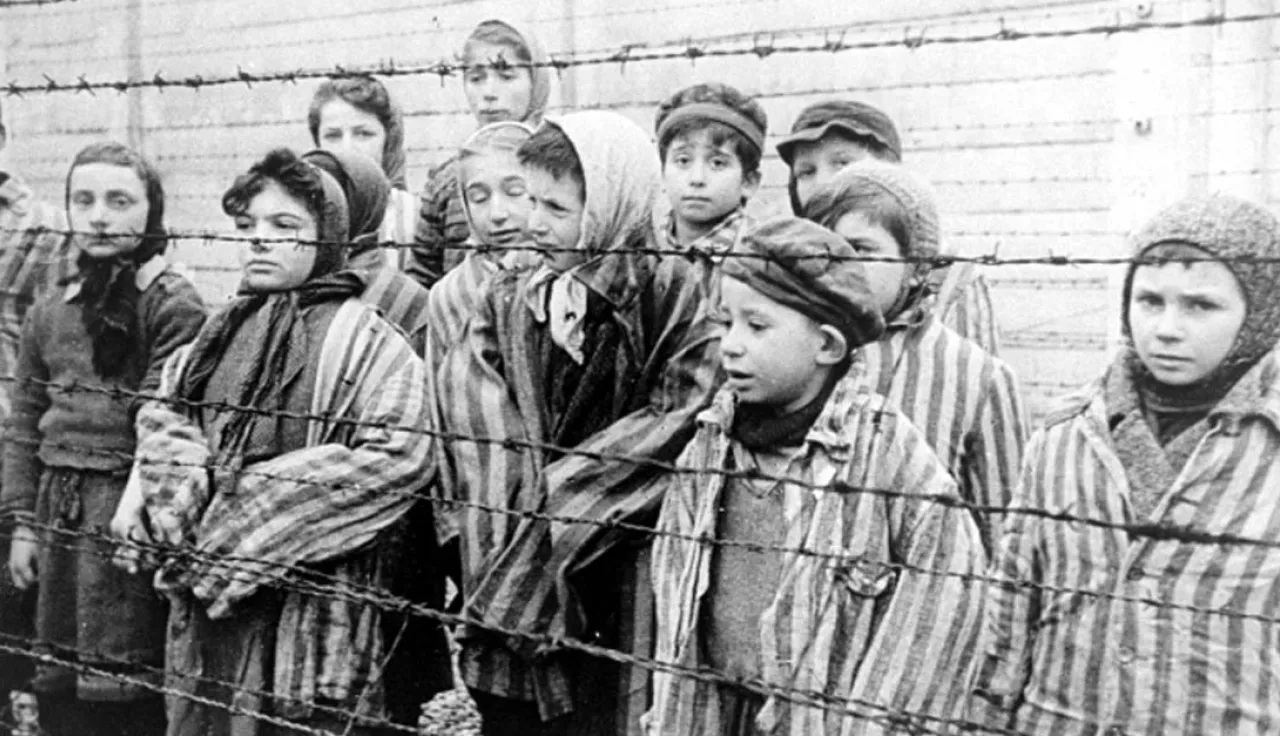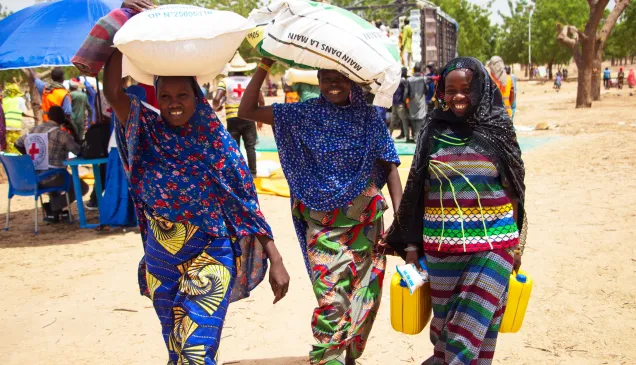Speech given by Peter Maurer, president of the ICRC, 28 April 2015, Geneva, Switzerland
History does not end. History is remembered, recounted, studied and discussed, time and again, and by each generation anew. 70 years is a lifetime – an appropriate moment therefore to remember the horrors of the Shoah and the liberation of the concentration camps.
I would like to thank all of you for joining us tonight. My very special thanks to our co-host, the World Jewish Congress, and President Ronald Lauder, to the CEO, Robert Singer, to Tom Gal, the Representative here in Geneva, and to the distinguished panelists who agreed to participate in the discussion.
Over the past seven decades, we have come to grips with the details of what was known for long and unspoken for too long: the unparalleled human disaster of the Holocaust, the power of fear, the danger of lawlessness disguised as law, the insidious nature of state terror, the "banality of evil", and the failure to act of those who knew.
Over the past seven decades, we have learned about the political, moral and professional failures of systems, institutions and individuals, which resulted in the man-made disaster and which rooted in what Karl W. Deutsch so aptly described as a "cognitive catastrophe" – or in other words, the inability of too many contemporaries to understand the very character of the Nazi regime.
Over the past seven decades, we have heard innumerable versions of the perverse justifications for the horrors of the Shoah. These justifications were first and foremost those of the perpetrators but they extended to the rest of the world who stood by and watched. Tragically, the leaders of the International Committee of the Red Cross were part of the by-standers who – when confronted with questions about the silence of the institution – defended standard responses to extraordinary circumstances: To speak now would be ineffective; it would not change the course of history; it would compromise existing access to people in need; it would reflect badly on the neutrality and impartiality of the organization etc... At the origin of such justifications, there were profound misunderstandings about the character of the system and the nature of terror. The ICRC did not see Nazi Germany for what it was. Instead, the organization maintained the illusion that the Third Reich was a 'regular partner', a State that occasionally violates laws, not unlike any army during WWI, occasionally using illegal means and methods of warfare.
We all know that the Shoah was a defining moment for the world, for humanity, for the Jewish community, and for international relations. It shaped and sharpened the expectations of public policies in numerous countries and in international relations with regard to the legal and moral obligations and responsibilities of individuals. As a historian, I spent many years studying German and European politics of the 1930s and 40s, trying to understand the dynamics of power and of totalitarian regimes as well as the breakdown of civility. As a Swiss diplomat I have experienced the strong tensions between historical truth and the politics of justifications and as a president of the ICRC I keep asking myself how the past disaster links to present day violence.
In the wake of the Shoah and of the Second World War, the international community adopted the fourth Geneva Convention with its focus on the protection of civilians, a novelty in an area of international law that had focused much more on protecting the wounded, sick and detained soldiers. Around the same time, the United Nations adopted the Convention against Genocide and in the years that followed, the international community saw accountability for war crimes, crimes against humanity and genocide emerge as triple red lines. The right to know, the right to reparation, the right to justice and the right of non-recurrence emerged as important benchmarks for dealing with the past and as necessary pillars of meaningful reconciliation. With regard to legal and policy frameworks, the world has learned some lessons from the Shoah.
In institutional terms, the ICRC also learned some hard lessons. It had failed to protect civilians and most notably the Jews persecuted and murdered by the Nazi regime; it had failed to understand the uniqueness of the inhumanity by responding to the outrageous with standard procedures; it had looked on helplessly and silently, not really trying – certainly not hard enough - to live up to the principle of humanity. The ICRC failed because it drew inexcusably false conclusions from perfectly valid observations. It failed as a humanitarian organization because it had lost its moral compass. This failure has become an intrinsic part of our institutional history.
Twenty years ago, my pre predecessor, Cornelio Sommaruga – whom I welcome warmly amongst us tonight – was the first ICRC president to publically recognize that the organization's failure to speak out was a moral defeat. I can only echo his judgment tonight and commend him for recognizing it when he did.
Since then, we have chosen to confront our past and to embrace transparency. Our public archives are proof of our acknowledgment of the past and our continued effort to confront uncomfortable truths. The ICRC has also adopted a new policy on confidentiality, explicitly acknowledging that there is a path to condemnation of acts of inhumanity. We have chosen not to let ourselves be cornered by the binary logic of silence vs. denunciation, which inevitably leads to paralysis. Instead, the ICRC has opened up many avenues for action: mobilizing High Contracting Parties, engaging diplomatically, reaching out to the public to explain our modus operandi, ceasing activities when confronted with unacceptable conditions imposed on it by warring parties, withdrawing from a context in extreme circumstances where staying would do more harm than good, and – ultimately – publicly denouncing violations of international humanitarian law. Today, the big question is not whether to speak out but how, when, and to whom we should speak on what, in order to further our objective of preserving human dignity and enlarging space for humanitarian action.
When mass atrocities are no longer hidden behind the walls of concentration camps and in the dark cellars of the Gestapo, when the display of inhumanity, anti-Semitism and exclusion is part of a generalized attempt to terrorize groups and societies at large, we may need more refined strategies than public outcry.
Given today's challenges, it will come as no surprise to you that the ICRC's current four-year strategy places a particular emphasis on furthering its humanitarian diplomacy agenda and capacities. Given our roots, our role and our responsibilities, we cannot just be a relief organization. We must put the protection of vulnerable people first, which entails injecting a more forceful dynamic between our daily work in favor of war-affected populations and our mandate to develop and promote international humanitarian law, and to influence the humanitarian policy developed by the High Contracting Parties to the Geneva Conventions.
Even the best and most ambitious institutional strategy will not solve the dilemmas that persist between the high principles that inform humanitarian action and the stark realities with which we are confronted in so many conflicts today. We are all aware that the opposite of failure is not necessarily success. But this should not mean that we do not strive to improve. Success for me involves asking the right questions, which is precisely what today's panel seeks to do.
We are invited to think about the singularity of the Nazi regime and the Holocaust, and whether it can be connected with enduring patterns of genocide. This raises a number of related questions, such as:
- Whether we can distinguish between violations of the law that take place within the framework of a general acceptance of the law and systematic violations that fundamentally question the principle of humanity?
- How to avoid misguided analogies that lead us to wrong conclusions?
- What is new and what is old?
- Where is the line between compromise and rotten compromise?
- When is persistent and patient engagement the right thing to do? And when is it a dangerous illusion?
Many have committed to learn from the past and not to see history repeat itself. Two weeks ago, on Yom Hashoah, or Holocaust Remembrance Day, the words 'never again' once more reverberated across the world. But for the ICRC, somehow, 'never again' resonates with difficulty because of what we see and experience on the ground every day. We cannot guarantee that a humanitarian catastrophe of the extent of the Holocaust will not happen again. On the contrary, we witness a catalogue of atrocities, every day, in wars across the globe.
In reflecting on what it means to have learned from the Shoah, in preparation for our gathering today, I re-read some of Justice Thomas Buergenthal's writings. In his famous book "A Lucky Child", he recounts his time as a lawyer and judge dealing with cases involving atrocities committed in the Balkans, Cambodia, Rwanda and El Salvador which triggered memories of his days in Auschwitz as a young boy. Buergenthal to me personifies the most positive turn history can take.
Many of you may recall when Buergenthal compares survival in Auschwitz with those kids who survive poverty and violence in today's urban slums. He certainly has shown the way: turning trauma and bare instinct for survival into productive energy to build institutions, strengthen accountability and legal frameworks and thus open spaces for more humane societies. Such are the ingredients to ensure that societies are learning the right things from the past. Such are the ingredients that allow an organization like the ICRC to move forward humbly yet decisively.
Whether in Syria, Iraq, Yemen or Palestine, whether in Ukraine or Colombia, in Myanmar or in the Mediterranean, the ICRC is challenged every day to leverage influence in order to assist and protect people from the impact of violence, to prevent violations of the law, and to ensure a minimum of humanity and to prevent worse: that is a beginning and never enough!
Thank you




